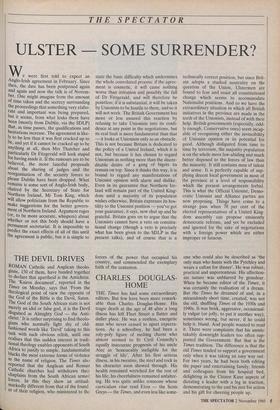THE SPECTATOR
ULSTER -SOME SURRENDER?
We were first told to expect an Anglo-Irish agreement in February. Since then, the date has been postponed again and again and now the talk is of Novem- ber. One might imagine from the amount of time taken and the secrecy surrounding the proceedings that something very elabo- rate and important was being prepared, but it seems, from what leaks there have been (mostly from Dublin, via the SDLP) that, as time passes, the qualifications and hesitations increase. The agreement is like- ly to be less than it was first cracked up to be, and yet if it cannot be cracked up to be anything at all, then Mrs Thatcher and particularly Dr Fitzgerald will look stupid for having made it. If the rumours are to be believed, the more fanciful proposals about the sharing of judges and the reorganisation of the security forces to Please Dublin have been dropped. What remains is some sort of Anglo-Irish body, chaired by the Secretary of State for Northern Ireland, Mr Tom King, which will allow politicians from the Republic to make suggestions for the better govern- ment of Northern Ireland. Argument rages (or, to be more accurate, whispers) about whether or not this body should have a Permanent secretariat. It is impossible to Predict the exact effects of all of this until the agreement is public, but it is simple to state the basic difficulty which undermines the whole convoluted process: if the agree- ment is cosmetic, it will cause nothing worse than irritation and possibly the fall of Dr Fitzgerald, and will therefore be pointless; if it is substantial, it will be taken by Unionists to be hostile to them, and so it will not work. The British Government has more or less assured this reaction by refusing to take Unionists into its confi- dence at any point in the negotiations, but its real fault is more fundamental than that — it looks at Unionism only as an obstacle. This is not because Britain is dedicated to the policy of a United Ireland, which it is not, but because it has chosen to regard Unionism as nothing more than the discre- ditable desire of a gang of bigots to remain on top. Since it thinks this way, it is bound to regard any manifestations of Unionist opinion with alarm and dislike. Even in its guarantee that Northern Ire- land will remain part of the United King- dom until a majority of its population wishes otherwise, Britain expresses its hos- tility to the Unionist position you've got your guarantee, it says, now shut up and be grateful. Britain goes on to argue that the Unionists cannot have a veto on constitu- tional change (though a veto is precisely what has been given to the SDLP in the present talks), and of course that is a
technically correct position; but since Brit- ain adopts a studied neutrality on the question of the Union, Ulstermen are bound to fear and resist all constitutional change which seems to accommodate Nationalist positions. And so we have the extraordinary situation in which all British initiatives in the province are made in the teeth of the Unionists, instead of with their help. British governments (especially, odd- ly enough, Conservative ones) seem incap- able of recognising either the invincibility of Unionist opinion or its potential for good. Although disfigured from time to time by terrorism, the majority population is on the whole more law-abiding and much better disposed to the forces of law than the minority. It still contains men of talent and sense. It is perfectly capable of sup- plying decent local government in most of the province at a level of responsibility which the present arrangements forbid. This is what the Official Unionist, Demo- cratic Unionist and Alliance parties are now proposing. Things have come to a strange pass when 70 per cent of the elected representatives of a United King- dom assembly can propose eminently democratic reforms, and yet be excluded and ignored for the sake of negotiations with a foreign power which are either improper or fatuous.






















































 Previous page
Previous page